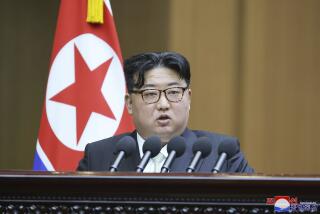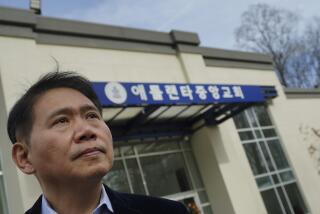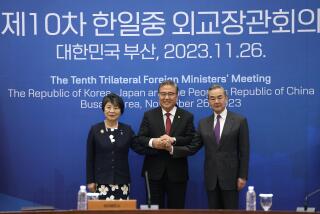Obama to pitch U.S. immigration reform from South Korea
SEOUL -- President Obama plans to honor those who died in the Korean War with a surprising message for a foreign audience: a pitch for immigration reform back home.
At a naturalization ceremony Friday for 13 U.S. service members and seven military spouses stationed in South Korea, he will offer a tribute to the contributions that naturalized American citizens have made through military service, according to an official familiar with the event.
The ceremony offers a rare setting for a recurrent Obama message: that the U.S. will benefit if immigrants who already make the sacrifices of citizenship can enjoy the rights and privileges that go along with it.
The remarks, coming in the middle of an eight-day tour of Asia, will also be the opening message to a South Korean audience worried about national security and looking for reassurance from their ally. After the naturalization ceremony, Obama is to lay a wreath at the National War Memorial, remembering the U.S. role in the 1950-53 Korean War.
The promise of continued support is top of mind in Seoul. Its aggressive neighbor to the north is threatening more missile testing and live-fire artillery practice that typically follows the spring military exercises between the U.S. and South Korea.
The White House harbors no hope that North Korea will change that course of action anytime soon, but on his way to Seoul, Obama professed confidence that the long-term regional strategy and long-term U.S. presence eventually will make a difference.
“We can continue to apply more and more pressure on North Korea so that, at some juncture, they end up taking a different course,” Obama said at a news conference with the Japanese prime minister before leaving Tokyo.
Obama isn’t in Seoul to unveil new policy, but to emphasize the U.S. commitment to regional security.
“The meeting between the two leaders will be an important moment to show strength in the alliance, a strong show of deterrence, that will also be important for helping to stabilize the region,” said Victor Cha, Korea chair at the Washington-based Center for Strategic and International Studies.
Obama arrives in Seoul bearing a set of Korean national treasures shipped out of the country by an American soldier during the Korean War.
Last fall, U.S. customs officials seized a cache of Korean treasures, including nine ancient royal seals, from the survivors of a Marine lieutenant who served in the conflict.
Among the artifacts are dynastic seals dating back several centuries. The White House is returning them as a gesture of respect for Korean history and culture.
While Obama focuses on nurturing relationships with Asian allies this week, his closest advisors are mindful of his relative silence on domestic policy back home.
The naturalization ceremony is the rare event that speaks to a foreign and domestic audience alike, one advisor said.
Military service doesn’t mean automatic U.S. citizenship, but special provisions of immigration law allow federal officials to expedite the application and naturalization process for those who have served.
Obama plans to salute those newly minted Americans, along with other U.S. troops stationed in South Korea, during his first hours in the country.
More to Read
Start your day right
Sign up for Essential California for news, features and recommendations from the L.A. Times and beyond in your inbox six days a week.
You may occasionally receive promotional content from the Los Angeles Times.







